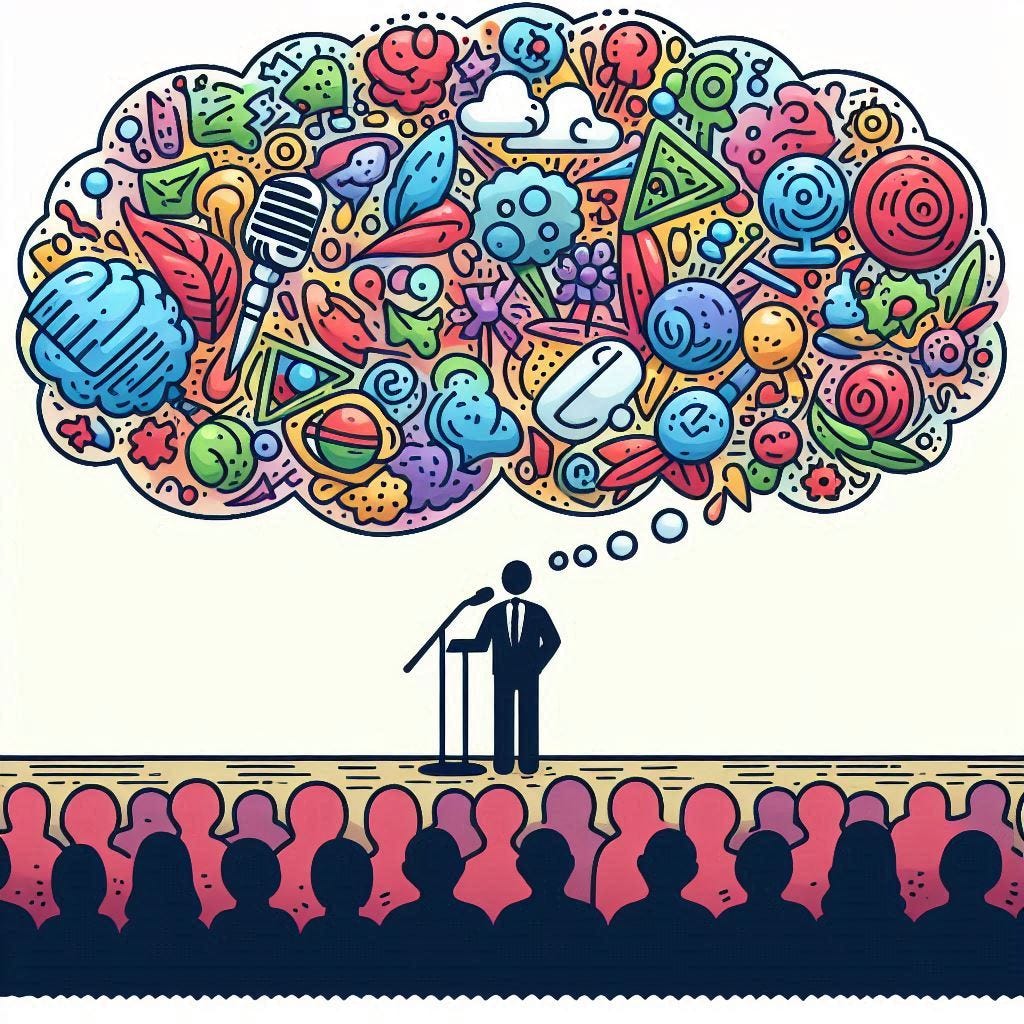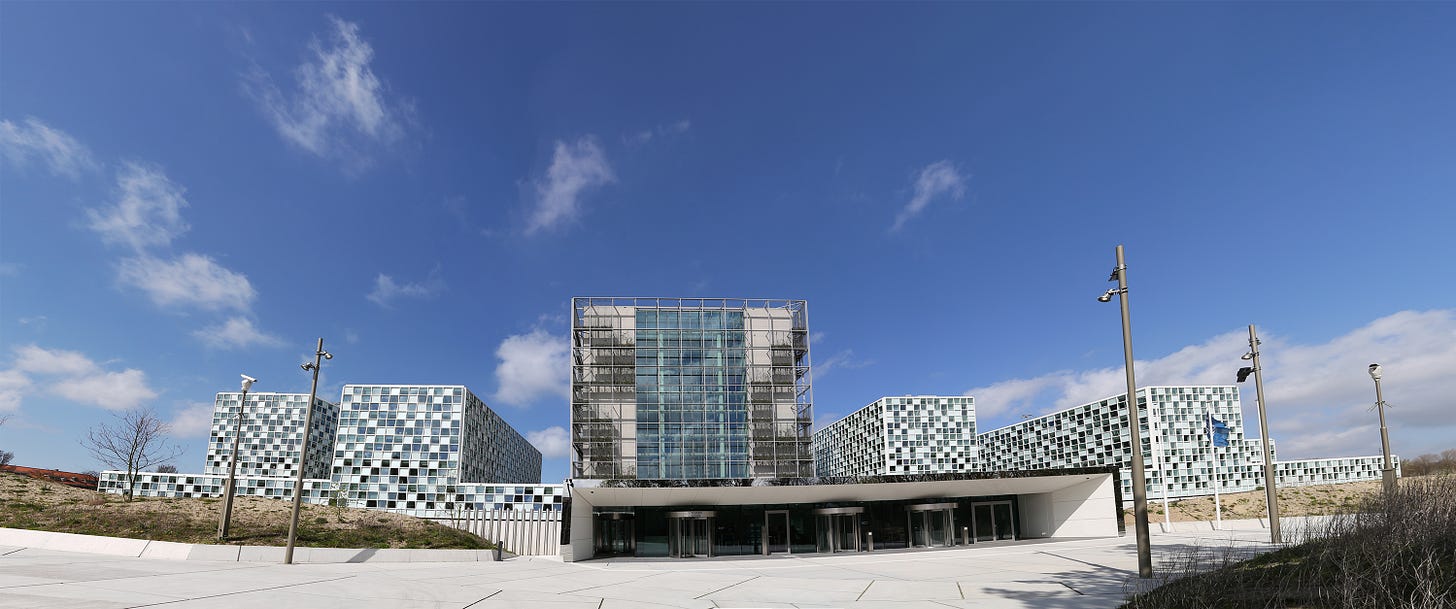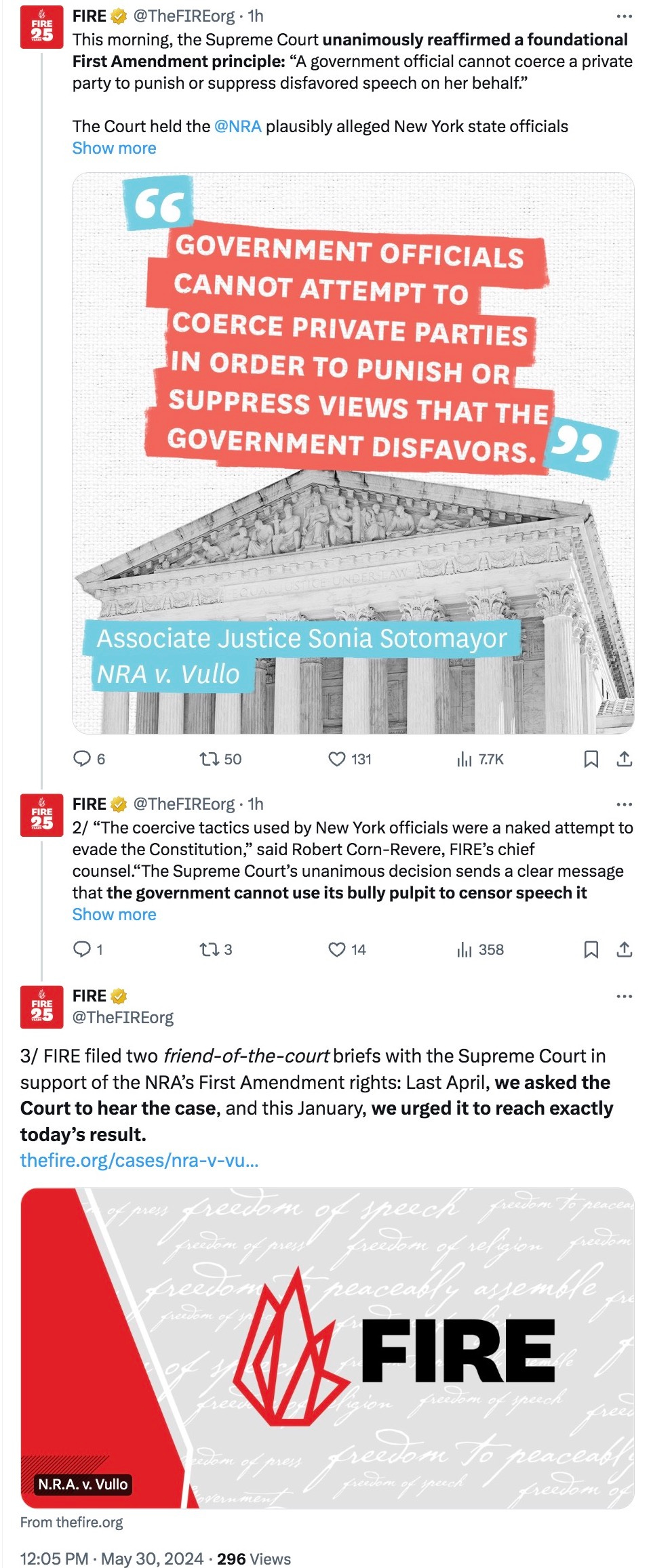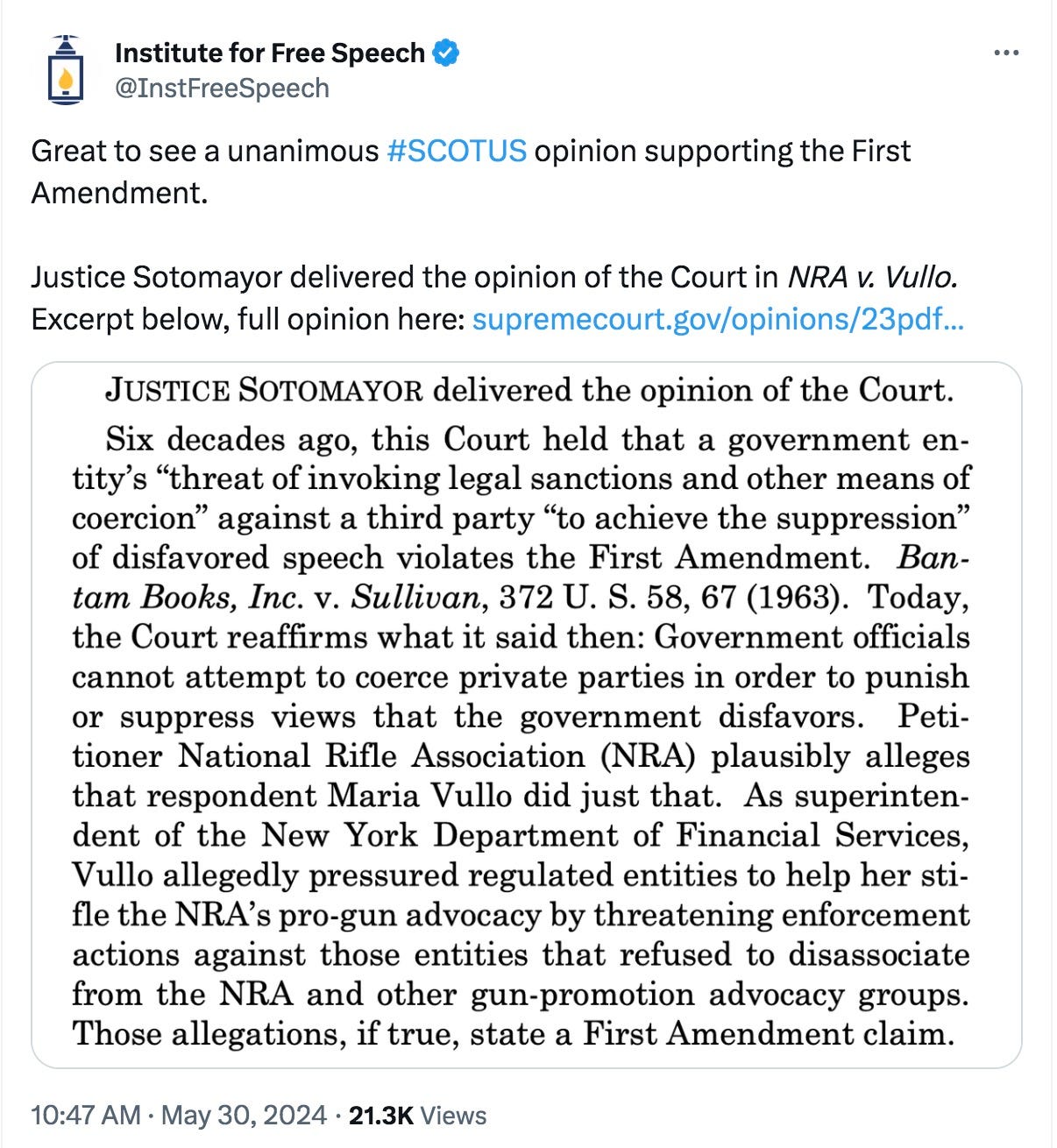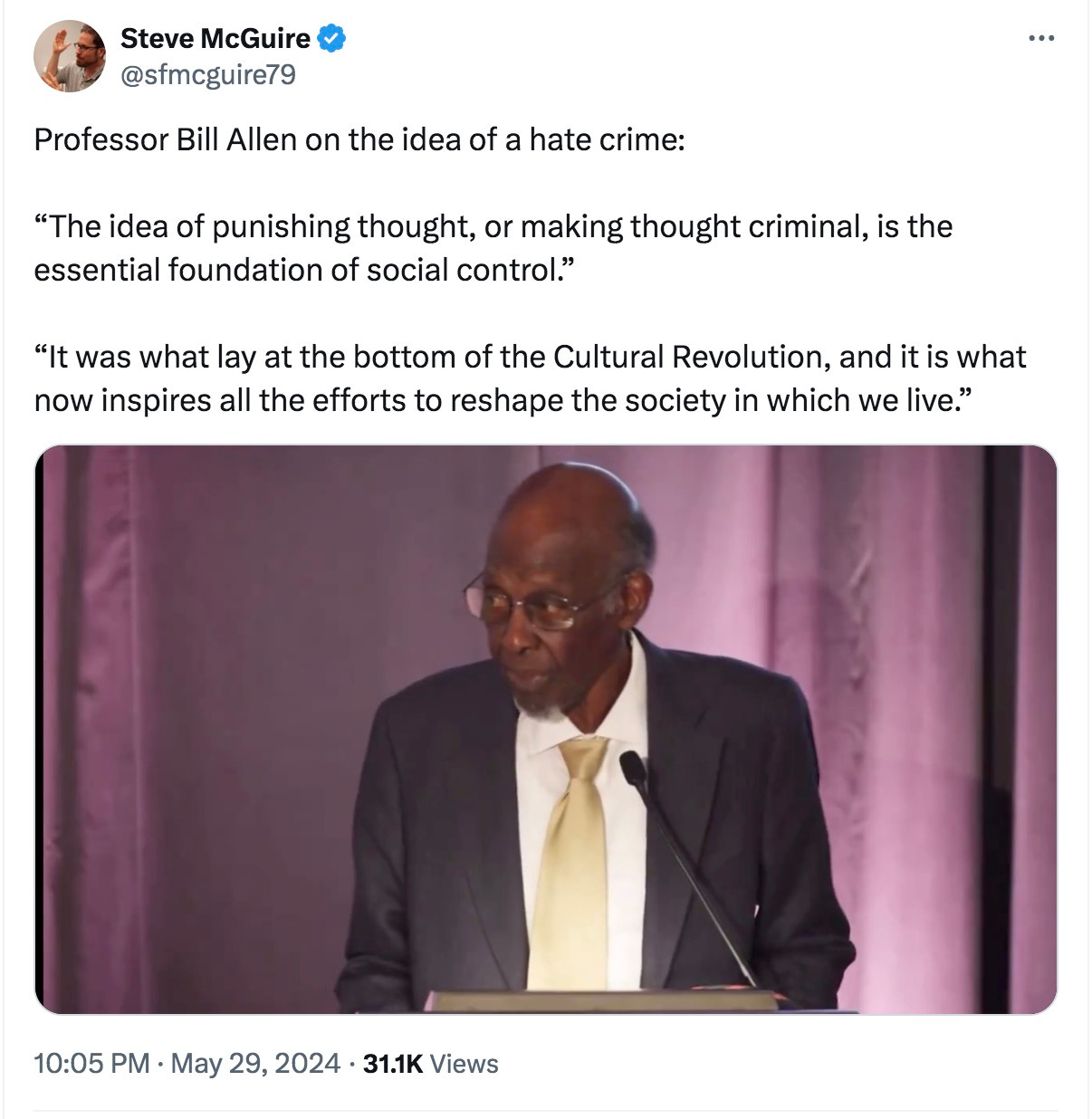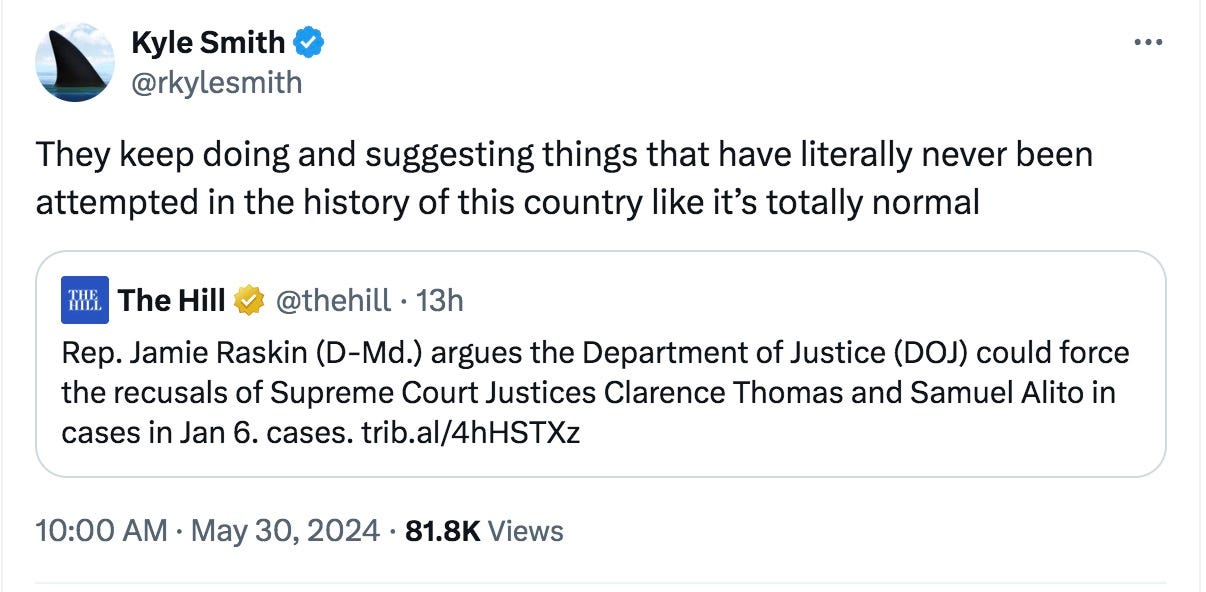E-Pluribus | May 30, 2024
Defund the thought police; international injustice; and an alternative to the oppressive America narrative.
A round-up of the latest and best musings on the rise of illiberalism in the public discourse:
David Bromwich: Private Thought and Public Speech
We were all told growing up to think before we speak, but how does this translate into the large arena of public dialogue and working through new or controversial ideas? Writing at Compact Magazine, David Bromwich explores the battle between outrageous speech and censorship and how to keep the former from being used to justify the latter.
Our private thoughts as we begin to speak can be a kind of dreaming out loud. We will translate them properly, later on, but we begin by muttering, maybe too audibly for our own good. W.B. Yeats said that “rhetoric is heard, poetry overheard,” and it is possible that our dreaming-aloud utterances should be rated closer to poetry, at least in this narrow sense: that the affirmations they avow or imply don’t yet want to be heard, only overheard. Just as Yeats was imagining the reader of genuine poetry to be a kindly eavesdropper, we may imagine the audience that overhears the inchoate poetry of our partial speech to be not unkindly disposed—not, that is, so hostile as to betray the private words by playing them into a megaphone and assigning the speaker’s name.
The philosopher of language W.V.O. Quine expounded a principle he called “charity in translation,” according to which, when confronted by an utterance that might be translated two ways, one of which makes it nonsense and the other, sense, we should give the speaker credit for probably intending the version that makes sense. Something like this principle should apply in situations of expressive or persuasive speech where the words may invite one of two responses, (a) that it is a non-obnoxious opinion vaguely or imperfectly formulated, or (b) that it is a bigoted opinion, so poisonously unacceptable that its speaker deserves to suffer public humiliation and ostracism. In such an ambiguous context, charity in translation suggests that we favor the innocent version of the speaker’s intention.
Dreaming aloud may be a stretched and fanciful description of how private thoughts make their way into a not-yet-answerable approximation of public speech. We can recognize anyway that many thoughts that eventuate in speech are in their essence experimental. We are testing the air, seeing what it sounds like when our friends are around, wondering how it strikes them, possibly but not necessarily curious to know the way it would be received by bare acquaintances or strangers.
[. . .]
The truth is that many people first discover the depth of a given belief, or even the fact that they hold the belief at all, when they hear its opposite enunciated and find themselves saying No. We may say no at first to ourselves. But I think an early experience of saying no, out loud, is for many people their first intimation of self-knowledge. It can be a starting point, too, for a kind of social knowledge that in more graduated terms will lead to a patient involvement in public arguments that have more than one side. Those arguments are conducted in a mode of speaking and listening in which it is possible to hear sentences such as “Why do you put it like that?” or “Can you remind me of the evidence?” The radical and self-formative power of hearing oneself say no, often for reasons one could hardly explain initially, seems elemental in our moral nature. It is, in fact, as vital to the growth of conscience as the act of willful disobedience about which one is later compelled to reflect with an uneasy mind.
Read the whole thing.
Norman J.W. Goda: The Politicisation of International Justice
Warrants recently issued by the International Criminal Court for both Israeli and Hamas officials have drawn praise and ridicule. At Quillette, Norman Goda looks closely at what the ICC prosecutor is and is not saying that reveals the political motivations behind the ICC actions.
The ICC’s [International Criminal Court] investigation of “the situation in Palestine”—defined as Gaza, the West Bank, and East Jerusalem—began in March 2021 under Khan’s predecessor as ICC prosecutor, Fatou Bensouda of Gambia. On 1 January 2015, Palestinian Authority president Mahmoud Abbas referred a complaint to the ICC following the 2014 Hamas–Israeli war. Bensouda was mindful that “Palestine’s statehood under international law does not seem to have been definitively resolved,” and therefore, that the ICC might lack clear jurisdiction. Nevertheless, Bensouda argued (and the pre-trial chamber of the ICC readily agreed) that Palestine is a “state” for three reasons. First, the UN General Assembly recognised the Palestinian right to self-determination and Palestinian statehood in 1988; second, “the right to self-determination is undoubtedly a fundamental human right”; and third, the Palestinian Authority adhered to the Rome Statute on 31 December 2014.
Bensouda’s investigation was retroactive to the 2014 war. It aimed to identify crimes committed by both Israel and Hamas against the people of Palestine, who it said ought to have been under the sole rule of the Palestinian Authority. Bensouda’s preliminary investigation ended in 2019. It argued that there was a reasonable basis to believe that Israel and Hamas had both committed war crimes in Gaza. Bensouda emphasised Israel’s “disproportionate attacks” on Gaza in retaliation for Hamas rocket launches, but she also mentioned that Hamas had violated international law by, inter alia, attacking Gazan civilians and using them as shields.
This was where matters stood until 2023–4. The Hamas massacre committed on 7 October 2023 far outstripped anything Hamas had done previously. Israel’s response—which aimed to destroy Hamas once and for all by killing its fighters, destroying its rocket launchers, and dismantling its tunnel fortifications—has also exceeded previous Israeli countermeasures.
[. . .]
[I]f the ICC intends to secure the court’s reputation with anti-Israel states and advocates while maintaining an appearance of even-handedness, a certain amount of dexterity is required. In the warrant application, Khan has expanded upon Bensouda’s model of charging Hamas’s and Israel’s leaders equally, but this time, to the point of legal acrobatics. The warrant application does not charge Israel’s leaders with genocide. Khan implicitly rejects the genocide charges made by South Africa and countless demonstrators worldwide that were given credence by the ICJ [International Court of Justice.]
[. . .]
Khan has chosen instead to emphasise “war crimes” as the chief category of transgression for both Hamas and Israeli leaders. But to charge Netanyahu and Gallant with war crimes, Khan relies upon a narrative that does not withstand scrutiny. He emphasises Israel’s “total siege of Gaza,” which he says has “intentionally and systematically deprived the civilian population in all parts of Gaza of objects indispensable to human survival,” thereby creating the conditions for mass starvation. Israel’s leaders, he argues, aim to “collectively punish the civilian population of Gaza, whom they perceived as a threat to Israel.” Khan further insists that Netanyahu and Gallant are part of a “common plan [my emphasis] to use starvation as a method of war.” Khan does not say so, but the “common plan” language refers to the conspiracy charge brought against the Nazis by prosecutors at the International Military Tribunal at Nuremberg in 1945.
[. . .]
Khan’s arrest warrant has drawn a great deal of international criticism, primarily from the United States. On 20 May, Secretary of State Anthony Blinken, who has worked to alleviate the humanitarian crisis in Gaza, noted that the warrant embodied a “shameful” equivalence of Israel with Hamas. The latter, Blinken said, is a brutal terrorist organisation that still holds Israeli hostages seized on 7 October. Blinken also criticised Kahn for deliberately short-circuiting the ICC’s own procedures, which allow national judiciaries time to investigate such allegations on their own.
Predictably, numerous commentators have subsequently accused the US government of undermining the ICC. But the objection to Karim Khan’s warrant request is not just about false equivalencies and its timing. When one dissects the arguments in the warrant application, in the light of established facts and previous case law, one finds that obvious liberties have been taken with the truth. With Israel’s latest war, the politicisation of the ICC has arrived. Whether the court’s credibility can survive it remains an open question.
Read it all.
Murray Bessette & David Rose: America Was Built on Cooperation, Not Oppression
Beating up on America has long been a favorite pastime of political activists, particularly those on the left, though the right is not completely immune to the impulse. At Real Clear Politics, Murray Bessette and David Rose say the “oppression” narrative (though not without some truth) must be rejected, or the next generation of Americans will not truly understand what made the country great.
Identity politics makes for strange political bedfellows, but one thing on which virtually everyone on the left agrees is that the rise of the West and America is largely the story of the ever more effective oppression of the weak by the strong. This “oppression thesis” is powerful because it is simple. And it threads together all of the anti-American leftist ideological movements: identity politics, WOKE, 1619, DEI, and CRT. In American classrooms, it stitches together a “warts only” retelling of American history that hardly stokes pride and gratitude in being American.
Americans should take pride in the system of liberty our ancestors established that now delivers historically unprecedented levels of peace and prosperity. But the oppression thesis asserts that past and continuing systemic oppression makes America deserving of moral condemnation and unworthy of patriotic attachment.
Given the increasing dominance of the oppression thesis in American K-12 and college education, we should not be surprised that Gallup found large generational disparities in civic pride. Americans 55 and older are more than two and a half times more likely than those between the ages of 18 and 34 to express that they are extremely proud of being American.
While there is certainly oppression in America’s story, too often children and college students are not told of how Americans, not the American government, put an end to a variety of oppressive practices that were often protected by the power of government (e.g., Jim Crow laws, government-sanctioned school segregation). Such laws and policies were often put in place by elite political power brokers, not ordinary Americans.
But America’s story is not one driven solely or even mostly by oppression because a society cannot raise the level of general prosperity by means of piracy and plunder. Theft builds nothing; it merely rearranges what is already there. It is parasitic, not productive. Only the gains that arise from cooperation – working together to produce a whole greater than the sum of its parts – can result in more goods and services for the same number of people in society. This is what produced the unprecedented levels of general prosperity into which we were blessed to be born. A system rigged to only allow the fulfillment of ambition through cooperative gains is the real story of America.
Read it all here.
Around Twitter (X)
A unanimous Supreme Court comes down on the side of the First Amendment today:
Via Steve McGuire, Professor Bill Allen on hate crimes. Click for video.
And finally, is throwing everything at the wall to see what sticks really a strategy?




